HLT33115 Certificate III Health Services RPL Kit WAIFS 2017
VerifiedAdded on 2023/06/07
|50
|9091
|128
Practical Assignment
AI Summary
This document is a Recognition of Prior Learning (RPL) assessment kit for the HLT33115 Certificate III in Health Services Assistance (Assisting in nursing work with acute care), provided by the West Australian Institute of Further Studies (WAIFS). It outlines the RPL process, including application, interview, competency conversation, practical assessment, and potential gap training. The kit details the competencies required for the qualification, assessment information for candidates, and an assessment agreement. It also includes a section for candidates to provide evidence of their skills and knowledge through answering questions related to communication and collaboration in healthcare settings. This assessment kit is designed to streamline the RPL application process for experienced individuals in the health services field.
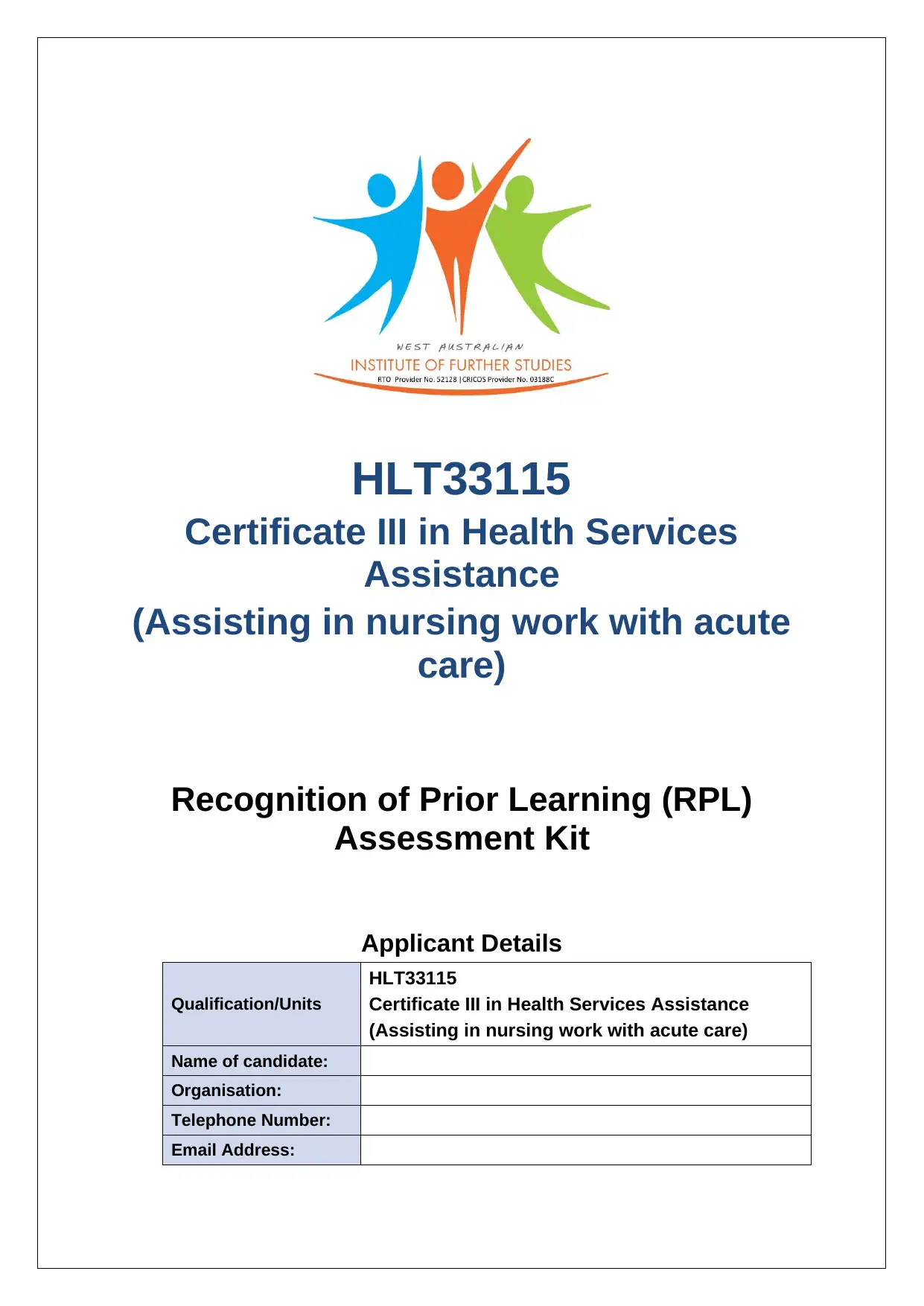
HLT33115
Certificate III in Health Services
Assistance
(Assisting in nursing work with acute
care)
Recognition of Prior Learning (RPL)
Assessment Kit
Applicant Details
Qualification/Units
HLT33115
Certificate III in Health Services Assistance
(Assisting in nursing work with acute care)
Name of candidate:
Organisation:
Telephone Number:
Email Address:
Certificate III in Health Services
Assistance
(Assisting in nursing work with acute
care)
Recognition of Prior Learning (RPL)
Assessment Kit
Applicant Details
Qualification/Units
HLT33115
Certificate III in Health Services Assistance
(Assisting in nursing work with acute care)
Name of candidate:
Organisation:
Telephone Number:
Email Address:
Paraphrase This Document
Need a fresh take? Get an instant paraphrase of this document with our AI Paraphraser
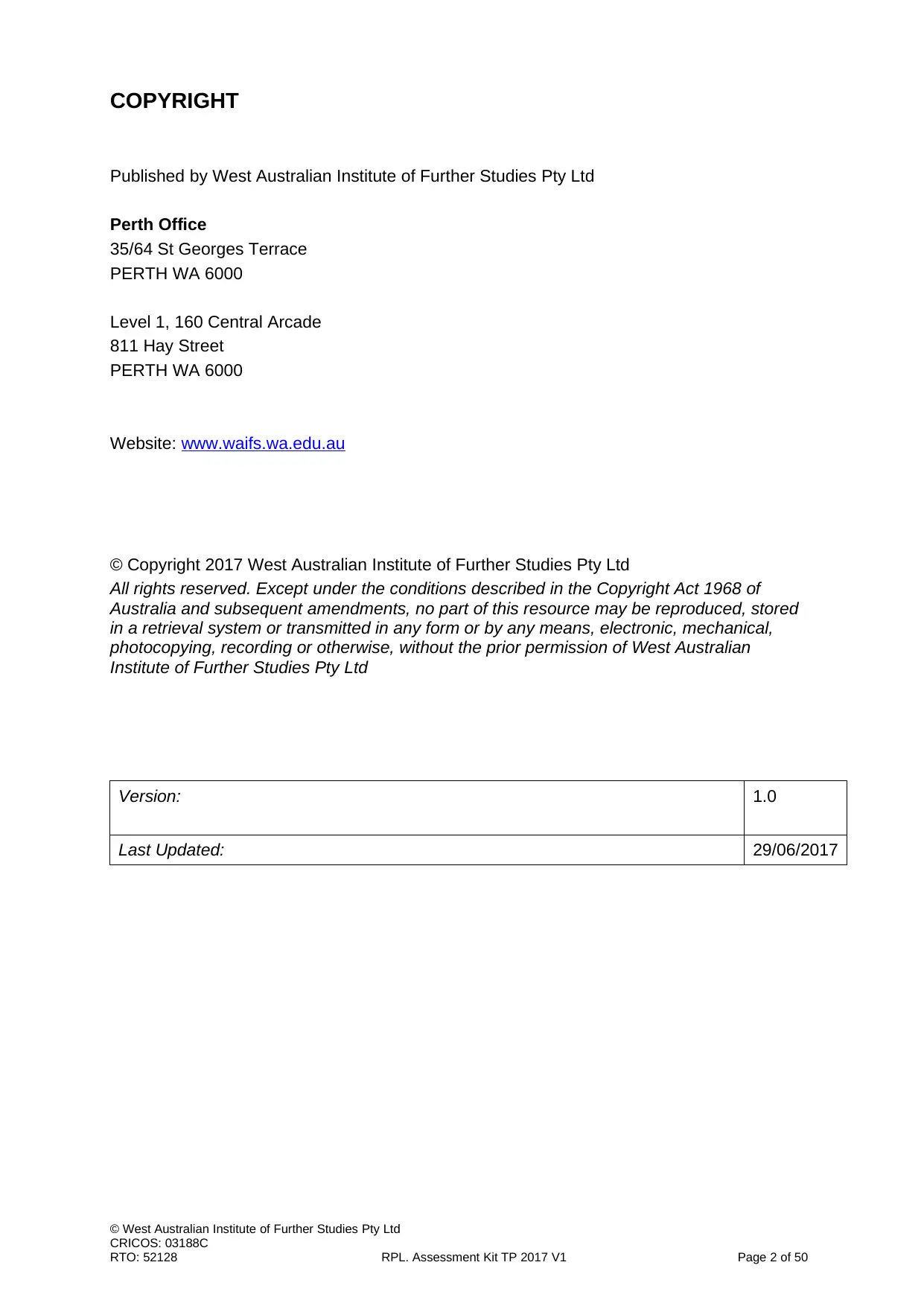
COPYRIGHT
Published by West Australian Institute of Further Studies Pty Ltd
Perth Office
35/64 St Georges Terrace
PERTH WA 6000
Level 1, 160 Central Arcade
811 Hay Street
PERTH WA 6000
Website: www.waifs.wa.edu.au
© Copyright 2017 West Australian Institute of Further Studies Pty Ltd
All rights reserved. Except under the conditions described in the Copyright Act 1968 of
Australia and subsequent amendments, no part of this resource may be reproduced, stored
in a retrieval system or transmitted in any form or by any means, electronic, mechanical,
photocopying, recording or otherwise, without the prior permission of West Australian
Institute of Further Studies Pty Ltd
Version: 1.0
Last Updated: 29/06/2017
© West Australian Institute of Further Studies Pty Ltd
CRICOS: 03188C
RTO: 52128 RPL. Assessment Kit TP 2017 V1 Page 2 of 50
Published by West Australian Institute of Further Studies Pty Ltd
Perth Office
35/64 St Georges Terrace
PERTH WA 6000
Level 1, 160 Central Arcade
811 Hay Street
PERTH WA 6000
Website: www.waifs.wa.edu.au
© Copyright 2017 West Australian Institute of Further Studies Pty Ltd
All rights reserved. Except under the conditions described in the Copyright Act 1968 of
Australia and subsequent amendments, no part of this resource may be reproduced, stored
in a retrieval system or transmitted in any form or by any means, electronic, mechanical,
photocopying, recording or otherwise, without the prior permission of West Australian
Institute of Further Studies Pty Ltd
Version: 1.0
Last Updated: 29/06/2017
© West Australian Institute of Further Studies Pty Ltd
CRICOS: 03188C
RTO: 52128 RPL. Assessment Kit TP 2017 V1 Page 2 of 50
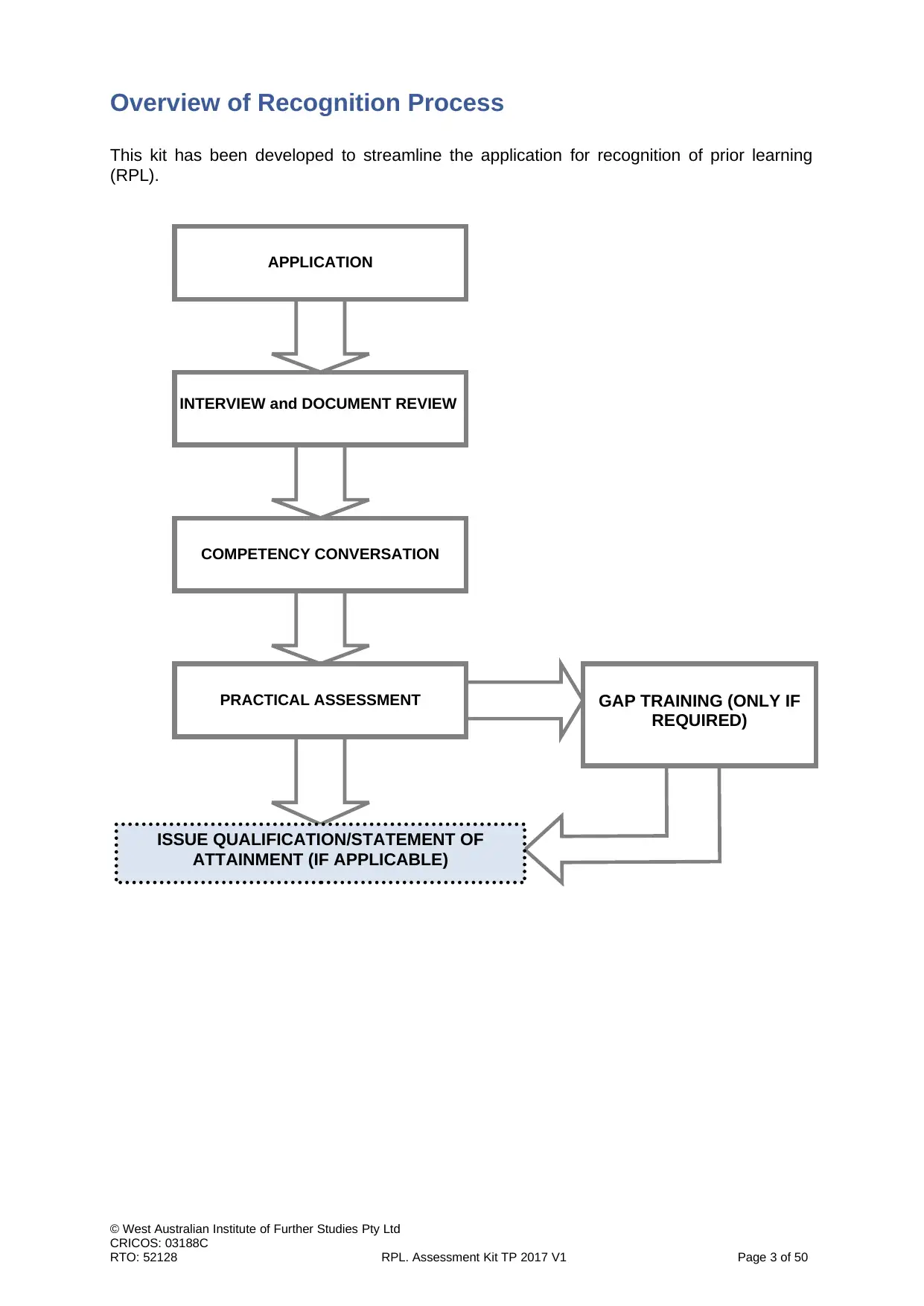
Overview of Recognition Process
This kit has been developed to streamline the application for recognition of prior learning
(RPL).
© West Australian Institute of Further Studies Pty Ltd
CRICOS: 03188C
RTO: 52128 RPL. Assessment Kit TP 2017 V1 Page 3 of 50
GAP TRAINING (ONLY IF
REQUIRED)
APPLICATION
PRACTICAL ASSESSMENT
COMPETENCY CONVERSATION
INTERVIEW and DOCUMENT REVIEW
ISSUE QUALIFICATION/STATEMENT OF
ATTAINMENT (IF APPLICABLE)
This kit has been developed to streamline the application for recognition of prior learning
(RPL).
© West Australian Institute of Further Studies Pty Ltd
CRICOS: 03188C
RTO: 52128 RPL. Assessment Kit TP 2017 V1 Page 3 of 50
GAP TRAINING (ONLY IF
REQUIRED)
APPLICATION
PRACTICAL ASSESSMENT
COMPETENCY CONVERSATION
INTERVIEW and DOCUMENT REVIEW
ISSUE QUALIFICATION/STATEMENT OF
ATTAINMENT (IF APPLICABLE)
⊘ This is a preview!⊘
Do you want full access?
Subscribe today to unlock all pages.

Trusted by 1+ million students worldwide
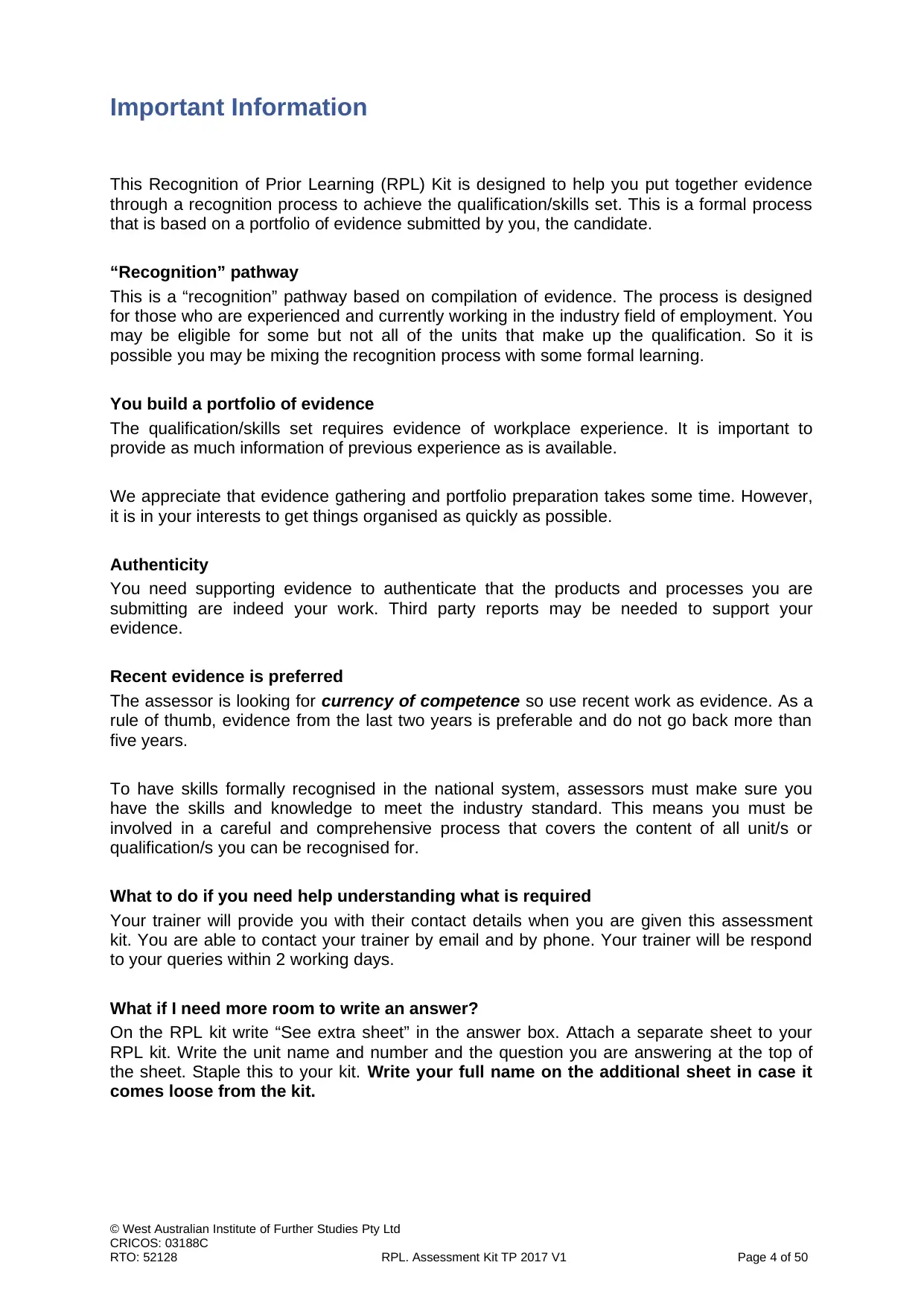
Important Information
This Recognition of Prior Learning (RPL) Kit is designed to help you put together evidence
through a recognition process to achieve the qualification/skills set. This is a formal process
that is based on a portfolio of evidence submitted by you, the candidate.
“Recognition” pathway
This is a “recognition” pathway based on compilation of evidence. The process is designed
for those who are experienced and currently working in the industry field of employment. You
may be eligible for some but not all of the units that make up the qualification. So it is
possible you may be mixing the recognition process with some formal learning.
You build a portfolio of evidence
The qualification/skills set requires evidence of workplace experience. It is important to
provide as much information of previous experience as is available.
We appreciate that evidence gathering and portfolio preparation takes some time. However,
it is in your interests to get things organised as quickly as possible.
Authenticity
You need supporting evidence to authenticate that the products and processes you are
submitting are indeed your work. Third party reports may be needed to support your
evidence.
Recent evidence is preferred
The assessor is looking for currency of competence so use recent work as evidence. As a
rule of thumb, evidence from the last two years is preferable and do not go back more than
five years.
To have skills formally recognised in the national system, assessors must make sure you
have the skills and knowledge to meet the industry standard. This means you must be
involved in a careful and comprehensive process that covers the content of all unit/s or
qualification/s you can be recognised for.
What to do if you need help understanding what is required
Your trainer will provide you with their contact details when you are given this assessment
kit. You are able to contact your trainer by email and by phone. Your trainer will be respond
to your queries within 2 working days.
What if I need more room to write an answer?
On the RPL kit write “See extra sheet” in the answer box. Attach a separate sheet to your
RPL kit. Write the unit name and number and the question you are answering at the top of
the sheet. Staple this to your kit. Write your full name on the additional sheet in case it
comes loose from the kit.
© West Australian Institute of Further Studies Pty Ltd
CRICOS: 03188C
RTO: 52128 RPL. Assessment Kit TP 2017 V1 Page 4 of 50
This Recognition of Prior Learning (RPL) Kit is designed to help you put together evidence
through a recognition process to achieve the qualification/skills set. This is a formal process
that is based on a portfolio of evidence submitted by you, the candidate.
“Recognition” pathway
This is a “recognition” pathway based on compilation of evidence. The process is designed
for those who are experienced and currently working in the industry field of employment. You
may be eligible for some but not all of the units that make up the qualification. So it is
possible you may be mixing the recognition process with some formal learning.
You build a portfolio of evidence
The qualification/skills set requires evidence of workplace experience. It is important to
provide as much information of previous experience as is available.
We appreciate that evidence gathering and portfolio preparation takes some time. However,
it is in your interests to get things organised as quickly as possible.
Authenticity
You need supporting evidence to authenticate that the products and processes you are
submitting are indeed your work. Third party reports may be needed to support your
evidence.
Recent evidence is preferred
The assessor is looking for currency of competence so use recent work as evidence. As a
rule of thumb, evidence from the last two years is preferable and do not go back more than
five years.
To have skills formally recognised in the national system, assessors must make sure you
have the skills and knowledge to meet the industry standard. This means you must be
involved in a careful and comprehensive process that covers the content of all unit/s or
qualification/s you can be recognised for.
What to do if you need help understanding what is required
Your trainer will provide you with their contact details when you are given this assessment
kit. You are able to contact your trainer by email and by phone. Your trainer will be respond
to your queries within 2 working days.
What if I need more room to write an answer?
On the RPL kit write “See extra sheet” in the answer box. Attach a separate sheet to your
RPL kit. Write the unit name and number and the question you are answering at the top of
the sheet. Staple this to your kit. Write your full name on the additional sheet in case it
comes loose from the kit.
© West Australian Institute of Further Studies Pty Ltd
CRICOS: 03188C
RTO: 52128 RPL. Assessment Kit TP 2017 V1 Page 4 of 50
Paraphrase This Document
Need a fresh take? Get an instant paraphrase of this document with our AI Paraphraser
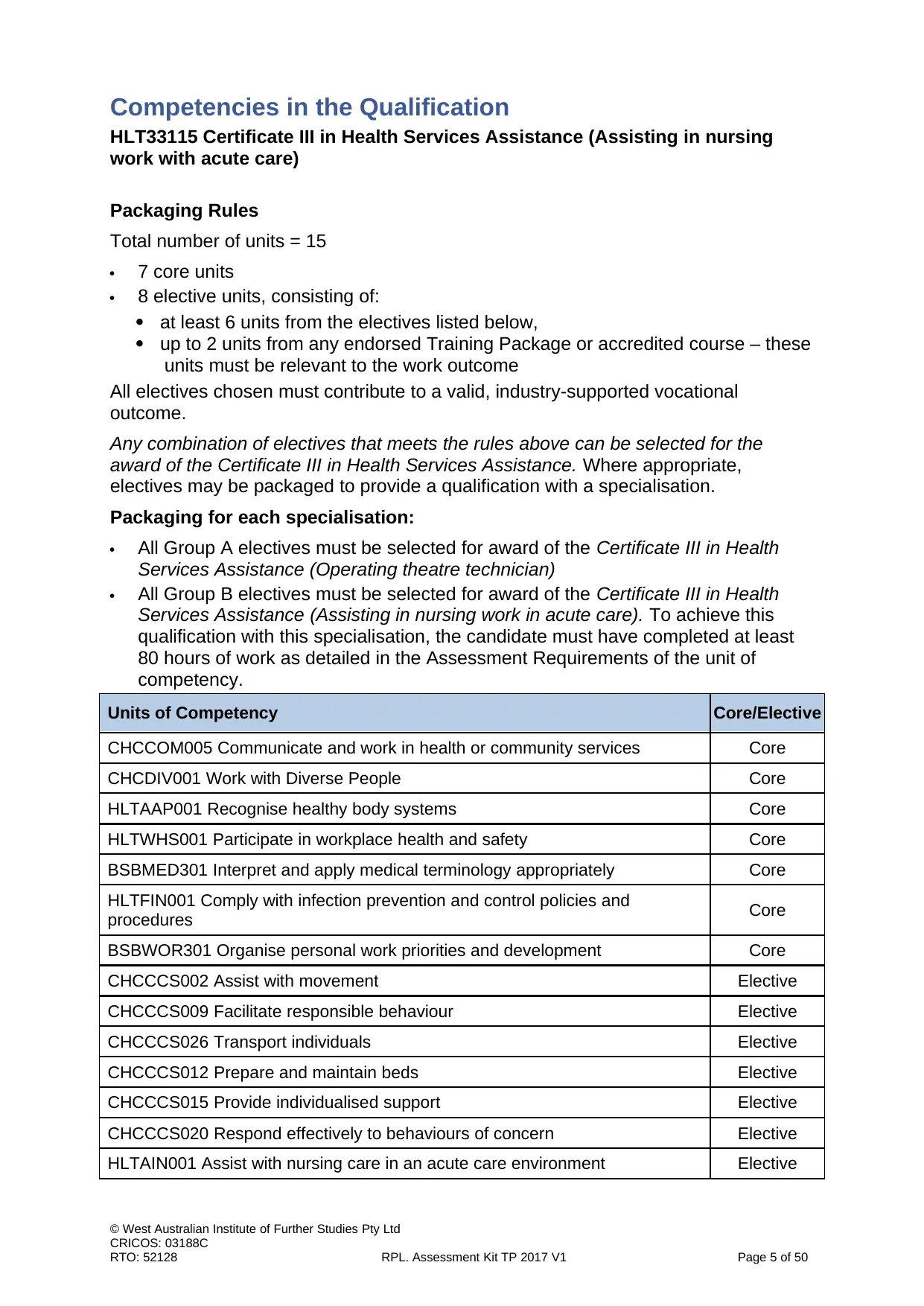
Competencies in the Qualification
HLT33115 Certificate III in Health Services Assistance (Assisting in nursing
work with acute care)
Packaging Rules
Total number of units = 15
7 core units
8 elective units, consisting of:
at least 6 units from the electives listed below,
up to 2 units from any endorsed Training Package or accredited course – these
units must be relevant to the work outcome
All electives chosen must contribute to a valid, industry-supported vocational
outcome.
Any combination of electives that meets the rules above can be selected for the
award of the Certificate III in Health Services Assistance. Where appropriate,
electives may be packaged to provide a qualification with a specialisation.
Packaging for each specialisation:
All Group A electives must be selected for award of the Certificate III in Health
Services Assistance (Operating theatre technician)
All Group B electives must be selected for award of the Certificate III in Health
Services Assistance (Assisting in nursing work in acute care). To achieve this
qualification with this specialisation, the candidate must have completed at least
80 hours of work as detailed in the Assessment Requirements of the unit of
competency.
Units of Competency Core/Elective
CHCCOM005 Communicate and work in health or community services Core
CHCDIV001 Work with Diverse People Core
HLTAAP001 Recognise healthy body systems Core
HLTWHS001 Participate in workplace health and safety Core
BSBMED301 Interpret and apply medical terminology appropriately Core
HLTFIN001 Comply with infection prevention and control policies and
procedures Core
BSBWOR301 Organise personal work priorities and development Core
CHCCCS002 Assist with movement Elective
CHCCCS009 Facilitate responsible behaviour Elective
CHCCCS026 Transport individuals Elective
CHCCCS012 Prepare and maintain beds Elective
CHCCCS015 Provide individualised support Elective
CHCCCS020 Respond effectively to behaviours of concern Elective
HLTAIN001 Assist with nursing care in an acute care environment Elective
© West Australian Institute of Further Studies Pty Ltd
CRICOS: 03188C
RTO: 52128 RPL. Assessment Kit TP 2017 V1 Page 5 of 50
HLT33115 Certificate III in Health Services Assistance (Assisting in nursing
work with acute care)
Packaging Rules
Total number of units = 15
7 core units
8 elective units, consisting of:
at least 6 units from the electives listed below,
up to 2 units from any endorsed Training Package or accredited course – these
units must be relevant to the work outcome
All electives chosen must contribute to a valid, industry-supported vocational
outcome.
Any combination of electives that meets the rules above can be selected for the
award of the Certificate III in Health Services Assistance. Where appropriate,
electives may be packaged to provide a qualification with a specialisation.
Packaging for each specialisation:
All Group A electives must be selected for award of the Certificate III in Health
Services Assistance (Operating theatre technician)
All Group B electives must be selected for award of the Certificate III in Health
Services Assistance (Assisting in nursing work in acute care). To achieve this
qualification with this specialisation, the candidate must have completed at least
80 hours of work as detailed in the Assessment Requirements of the unit of
competency.
Units of Competency Core/Elective
CHCCOM005 Communicate and work in health or community services Core
CHCDIV001 Work with Diverse People Core
HLTAAP001 Recognise healthy body systems Core
HLTWHS001 Participate in workplace health and safety Core
BSBMED301 Interpret and apply medical terminology appropriately Core
HLTFIN001 Comply with infection prevention and control policies and
procedures Core
BSBWOR301 Organise personal work priorities and development Core
CHCCCS002 Assist with movement Elective
CHCCCS009 Facilitate responsible behaviour Elective
CHCCCS026 Transport individuals Elective
CHCCCS012 Prepare and maintain beds Elective
CHCCCS015 Provide individualised support Elective
CHCCCS020 Respond effectively to behaviours of concern Elective
HLTAIN001 Assist with nursing care in an acute care environment Elective
© West Australian Institute of Further Studies Pty Ltd
CRICOS: 03188C
RTO: 52128 RPL. Assessment Kit TP 2017 V1 Page 5 of 50
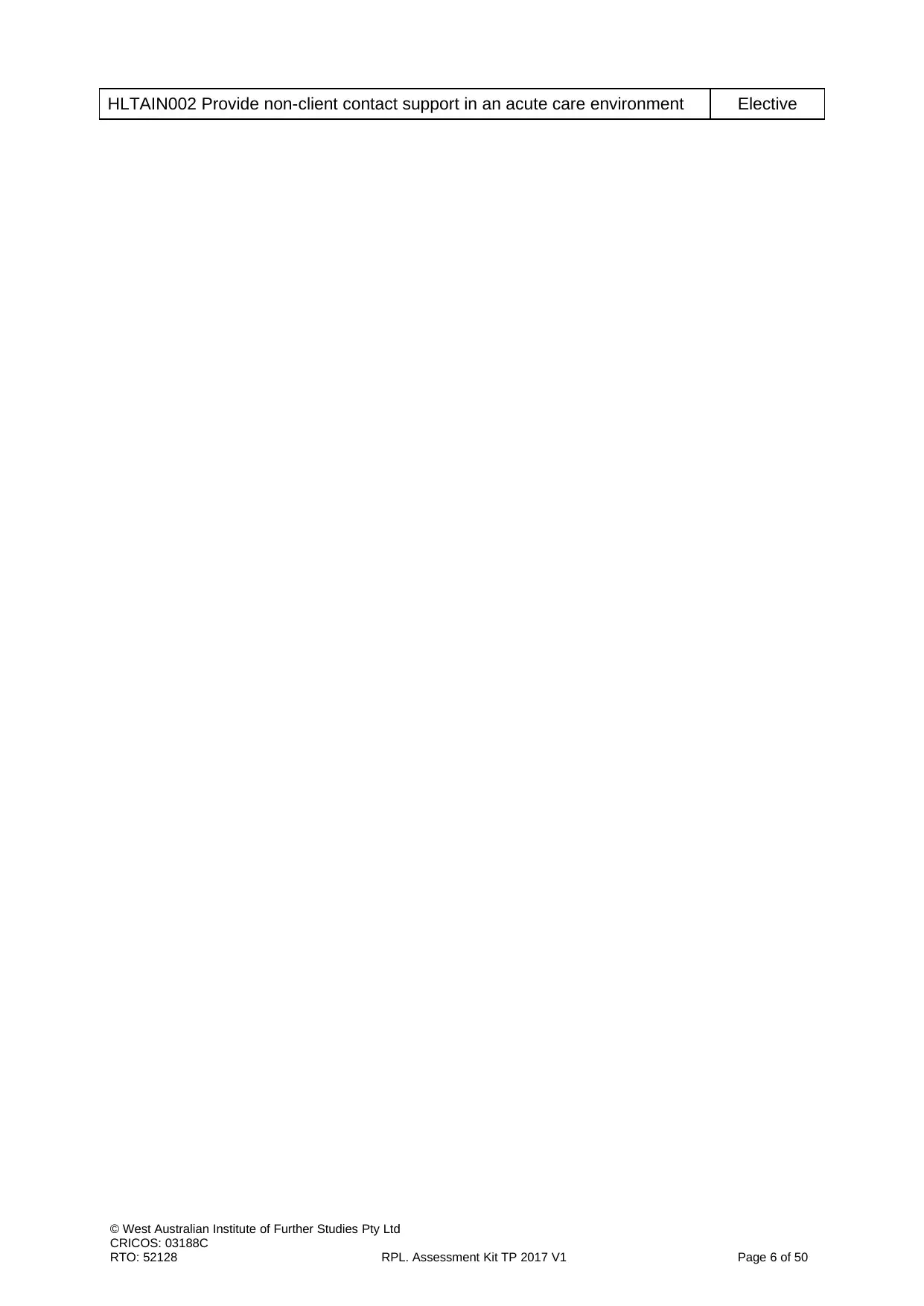
HLTAIN002 Provide non-client contact support in an acute care environment Elective
© West Australian Institute of Further Studies Pty Ltd
CRICOS: 03188C
RTO: 52128 RPL. Assessment Kit TP 2017 V1 Page 6 of 50
© West Australian Institute of Further Studies Pty Ltd
CRICOS: 03188C
RTO: 52128 RPL. Assessment Kit TP 2017 V1 Page 6 of 50
⊘ This is a preview!⊘
Do you want full access?
Subscribe today to unlock all pages.

Trusted by 1+ million students worldwide
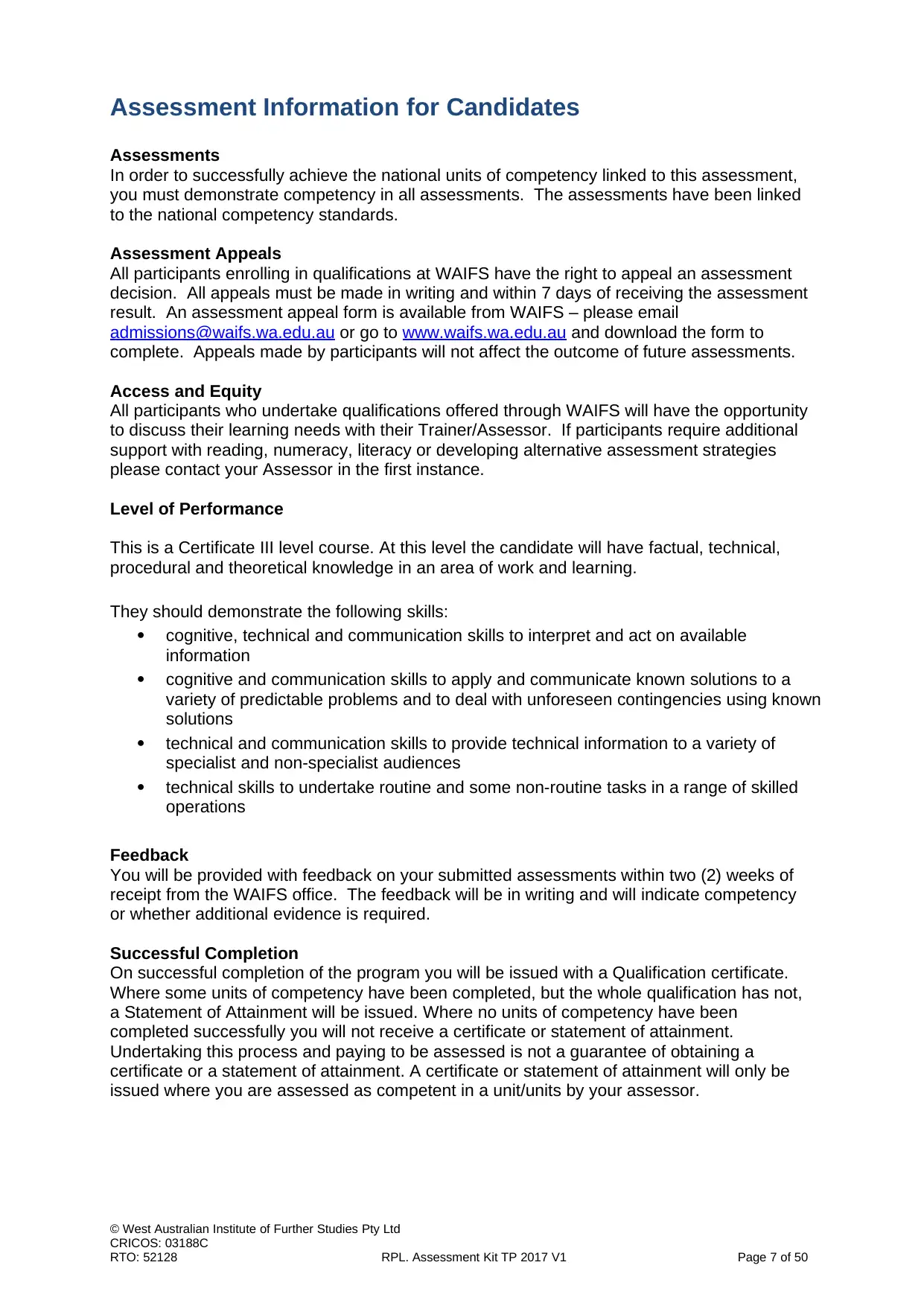
Assessment Information for Candidates
Assessments
In order to successfully achieve the national units of competency linked to this assessment,
you must demonstrate competency in all assessments. The assessments have been linked
to the national competency standards.
Assessment Appeals
All participants enrolling in qualifications at WAIFS have the right to appeal an assessment
decision. All appeals must be made in writing and within 7 days of receiving the assessment
result. An assessment appeal form is available from WAIFS – please email
admissions@waifs.wa.edu.au or go to www.waifs.wa.edu.au and download the form to
complete. Appeals made by participants will not affect the outcome of future assessments.
Access and Equity
All participants who undertake qualifications offered through WAIFS will have the opportunity
to discuss their learning needs with their Trainer/Assessor. If participants require additional
support with reading, numeracy, literacy or developing alternative assessment strategies
please contact your Assessor in the first instance.
Level of Performance
This is a Certificate III level course. At this level the candidate will have factual, technical,
procedural and theoretical knowledge in an area of work and learning.
They should demonstrate the following skills:
cognitive, technical and communication skills to interpret and act on available
information
cognitive and communication skills to apply and communicate known solutions to a
variety of predictable problems and to deal with unforeseen contingencies using known
solutions
technical and communication skills to provide technical information to a variety of
specialist and non-specialist audiences
technical skills to undertake routine and some non-routine tasks in a range of skilled
operations
Feedback
You will be provided with feedback on your submitted assessments within two (2) weeks of
receipt from the WAIFS office. The feedback will be in writing and will indicate competency
or whether additional evidence is required.
Successful Completion
On successful completion of the program you will be issued with a Qualification certificate.
Where some units of competency have been completed, but the whole qualification has not,
a Statement of Attainment will be issued. Where no units of competency have been
completed successfully you will not receive a certificate or statement of attainment.
Undertaking this process and paying to be assessed is not a guarantee of obtaining a
certificate or a statement of attainment. A certificate or statement of attainment will only be
issued where you are assessed as competent in a unit/units by your assessor.
© West Australian Institute of Further Studies Pty Ltd
CRICOS: 03188C
RTO: 52128 RPL. Assessment Kit TP 2017 V1 Page 7 of 50
Assessments
In order to successfully achieve the national units of competency linked to this assessment,
you must demonstrate competency in all assessments. The assessments have been linked
to the national competency standards.
Assessment Appeals
All participants enrolling in qualifications at WAIFS have the right to appeal an assessment
decision. All appeals must be made in writing and within 7 days of receiving the assessment
result. An assessment appeal form is available from WAIFS – please email
admissions@waifs.wa.edu.au or go to www.waifs.wa.edu.au and download the form to
complete. Appeals made by participants will not affect the outcome of future assessments.
Access and Equity
All participants who undertake qualifications offered through WAIFS will have the opportunity
to discuss their learning needs with their Trainer/Assessor. If participants require additional
support with reading, numeracy, literacy or developing alternative assessment strategies
please contact your Assessor in the first instance.
Level of Performance
This is a Certificate III level course. At this level the candidate will have factual, technical,
procedural and theoretical knowledge in an area of work and learning.
They should demonstrate the following skills:
cognitive, technical and communication skills to interpret and act on available
information
cognitive and communication skills to apply and communicate known solutions to a
variety of predictable problems and to deal with unforeseen contingencies using known
solutions
technical and communication skills to provide technical information to a variety of
specialist and non-specialist audiences
technical skills to undertake routine and some non-routine tasks in a range of skilled
operations
Feedback
You will be provided with feedback on your submitted assessments within two (2) weeks of
receipt from the WAIFS office. The feedback will be in writing and will indicate competency
or whether additional evidence is required.
Successful Completion
On successful completion of the program you will be issued with a Qualification certificate.
Where some units of competency have been completed, but the whole qualification has not,
a Statement of Attainment will be issued. Where no units of competency have been
completed successfully you will not receive a certificate or statement of attainment.
Undertaking this process and paying to be assessed is not a guarantee of obtaining a
certificate or a statement of attainment. A certificate or statement of attainment will only be
issued where you are assessed as competent in a unit/units by your assessor.
© West Australian Institute of Further Studies Pty Ltd
CRICOS: 03188C
RTO: 52128 RPL. Assessment Kit TP 2017 V1 Page 7 of 50
Paraphrase This Document
Need a fresh take? Get an instant paraphrase of this document with our AI Paraphraser
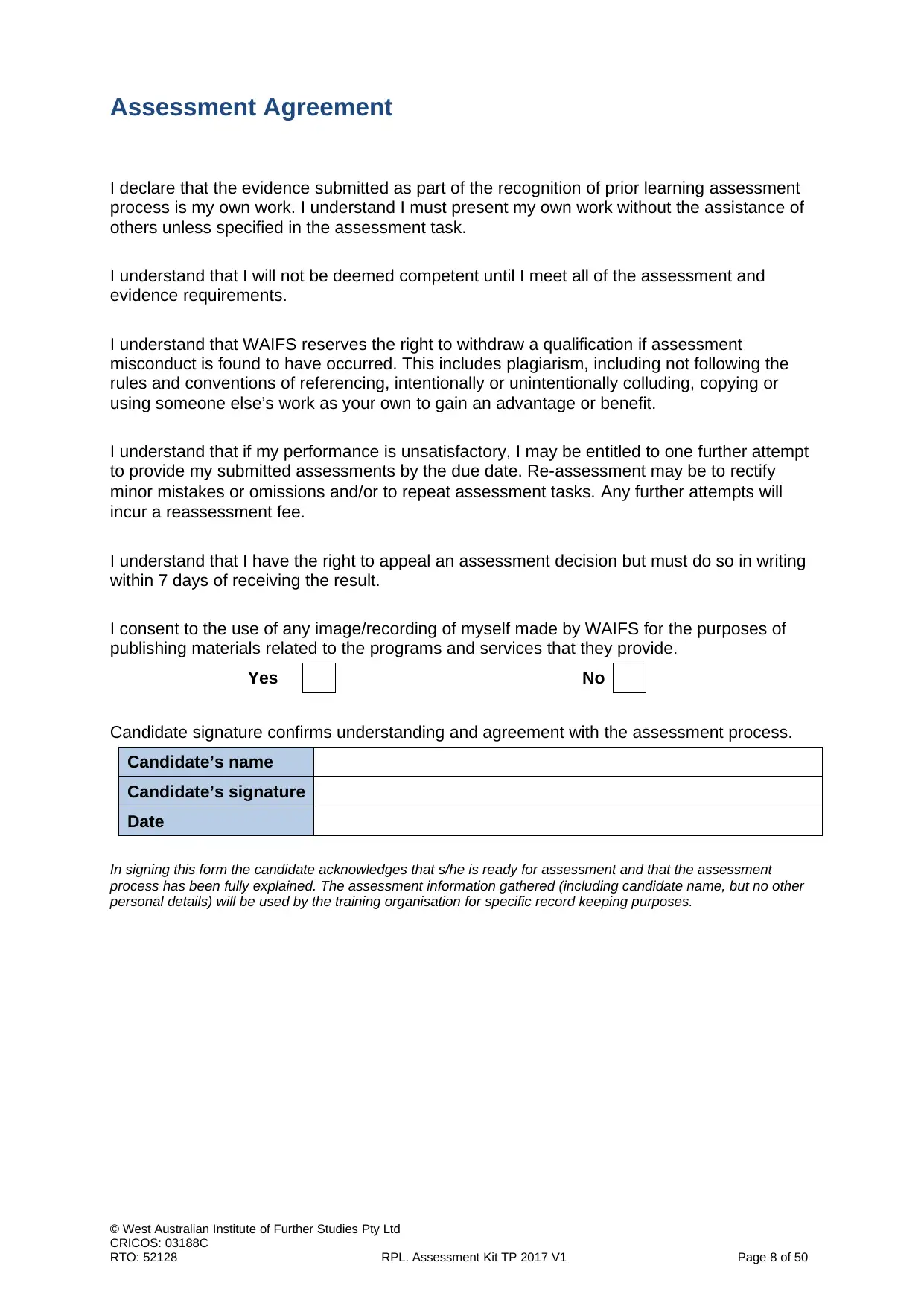
Assessment Agreement
I declare that the evidence submitted as part of the recognition of prior learning assessment
process is my own work. I understand I must present my own work without the assistance of
others unless specified in the assessment task.
I understand that I will not be deemed competent until I meet all of the assessment and
evidence requirements.
I understand that WAIFS reserves the right to withdraw a qualification if assessment
misconduct is found to have occurred. This includes plagiarism, including not following the
rules and conventions of referencing, intentionally or unintentionally colluding, copying or
using someone else’s work as your own to gain an advantage or benefit.
I understand that if my performance is unsatisfactory, I may be entitled to one further attempt
to provide my submitted assessments by the due date. Re-assessment may be to rectify
minor mistakes or omissions and/or to repeat assessment tasks. Any further attempts will
incur a reassessment fee.
I understand that I have the right to appeal an assessment decision but must do so in writing
within 7 days of receiving the result.
I consent to the use of any image/recording of myself made by WAIFS for the purposes of
publishing materials related to the programs and services that they provide.
Yes No
Candidate signature confirms understanding and agreement with the assessment process.
Candidate’s name
Candidate’s signature
Date
In signing this form the candidate acknowledges that s/he is ready for assessment and that the assessment
process has been fully explained. The assessment information gathered (including candidate name, but no other
personal details) will be used by the training organisation for specific record keeping purposes.
© West Australian Institute of Further Studies Pty Ltd
CRICOS: 03188C
RTO: 52128 RPL. Assessment Kit TP 2017 V1 Page 8 of 50
I declare that the evidence submitted as part of the recognition of prior learning assessment
process is my own work. I understand I must present my own work without the assistance of
others unless specified in the assessment task.
I understand that I will not be deemed competent until I meet all of the assessment and
evidence requirements.
I understand that WAIFS reserves the right to withdraw a qualification if assessment
misconduct is found to have occurred. This includes plagiarism, including not following the
rules and conventions of referencing, intentionally or unintentionally colluding, copying or
using someone else’s work as your own to gain an advantage or benefit.
I understand that if my performance is unsatisfactory, I may be entitled to one further attempt
to provide my submitted assessments by the due date. Re-assessment may be to rectify
minor mistakes or omissions and/or to repeat assessment tasks. Any further attempts will
incur a reassessment fee.
I understand that I have the right to appeal an assessment decision but must do so in writing
within 7 days of receiving the result.
I consent to the use of any image/recording of myself made by WAIFS for the purposes of
publishing materials related to the programs and services that they provide.
Yes No
Candidate signature confirms understanding and agreement with the assessment process.
Candidate’s name
Candidate’s signature
Date
In signing this form the candidate acknowledges that s/he is ready for assessment and that the assessment
process has been fully explained. The assessment information gathered (including candidate name, but no other
personal details) will be used by the training organisation for specific record keeping purposes.
© West Australian Institute of Further Studies Pty Ltd
CRICOS: 03188C
RTO: 52128 RPL. Assessment Kit TP 2017 V1 Page 8 of 50
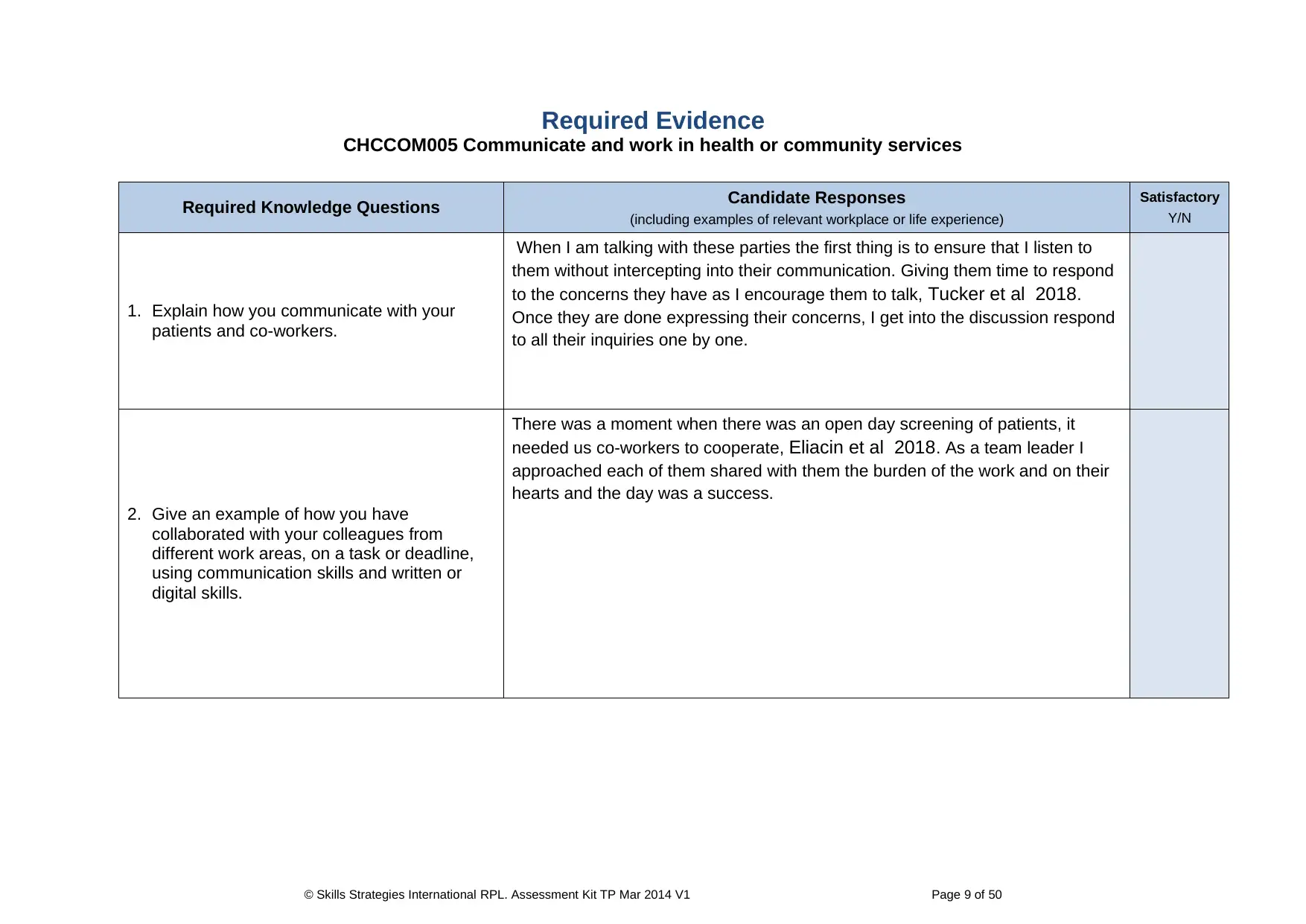
Required Evidence
CHCCOM005 Communicate and work in health or community services
Required Knowledge Questions Candidate Responses
(including examples of relevant workplace or life experience)
Satisfactory
Y/N
1. Explain how you communicate with your
patients and co-workers.
When I am talking with these parties the first thing is to ensure that I listen to
them without intercepting into their communication. Giving them time to respond
to the concerns they have as I encourage them to talk, Tucker et al 2018.
Once they are done expressing their concerns, I get into the discussion respond
to all their inquiries one by one.
2. Give an example of how you have
collaborated with your colleagues from
different work areas, on a task or deadline,
using communication skills and written or
digital skills.
There was a moment when there was an open day screening of patients, it
needed us co-workers to cooperate, Eliacin et al 2018. As a team leader I
approached each of them shared with them the burden of the work and on their
hearts and the day was a success.
© Skills Strategies International RPL. Assessment Kit TP Mar 2014 V1 Page 9 of 50
CHCCOM005 Communicate and work in health or community services
Required Knowledge Questions Candidate Responses
(including examples of relevant workplace or life experience)
Satisfactory
Y/N
1. Explain how you communicate with your
patients and co-workers.
When I am talking with these parties the first thing is to ensure that I listen to
them without intercepting into their communication. Giving them time to respond
to the concerns they have as I encourage them to talk, Tucker et al 2018.
Once they are done expressing their concerns, I get into the discussion respond
to all their inquiries one by one.
2. Give an example of how you have
collaborated with your colleagues from
different work areas, on a task or deadline,
using communication skills and written or
digital skills.
There was a moment when there was an open day screening of patients, it
needed us co-workers to cooperate, Eliacin et al 2018. As a team leader I
approached each of them shared with them the burden of the work and on their
hearts and the day was a success.
© Skills Strategies International RPL. Assessment Kit TP Mar 2014 V1 Page 9 of 50
⊘ This is a preview!⊘
Do you want full access?
Subscribe today to unlock all pages.

Trusted by 1+ million students worldwide
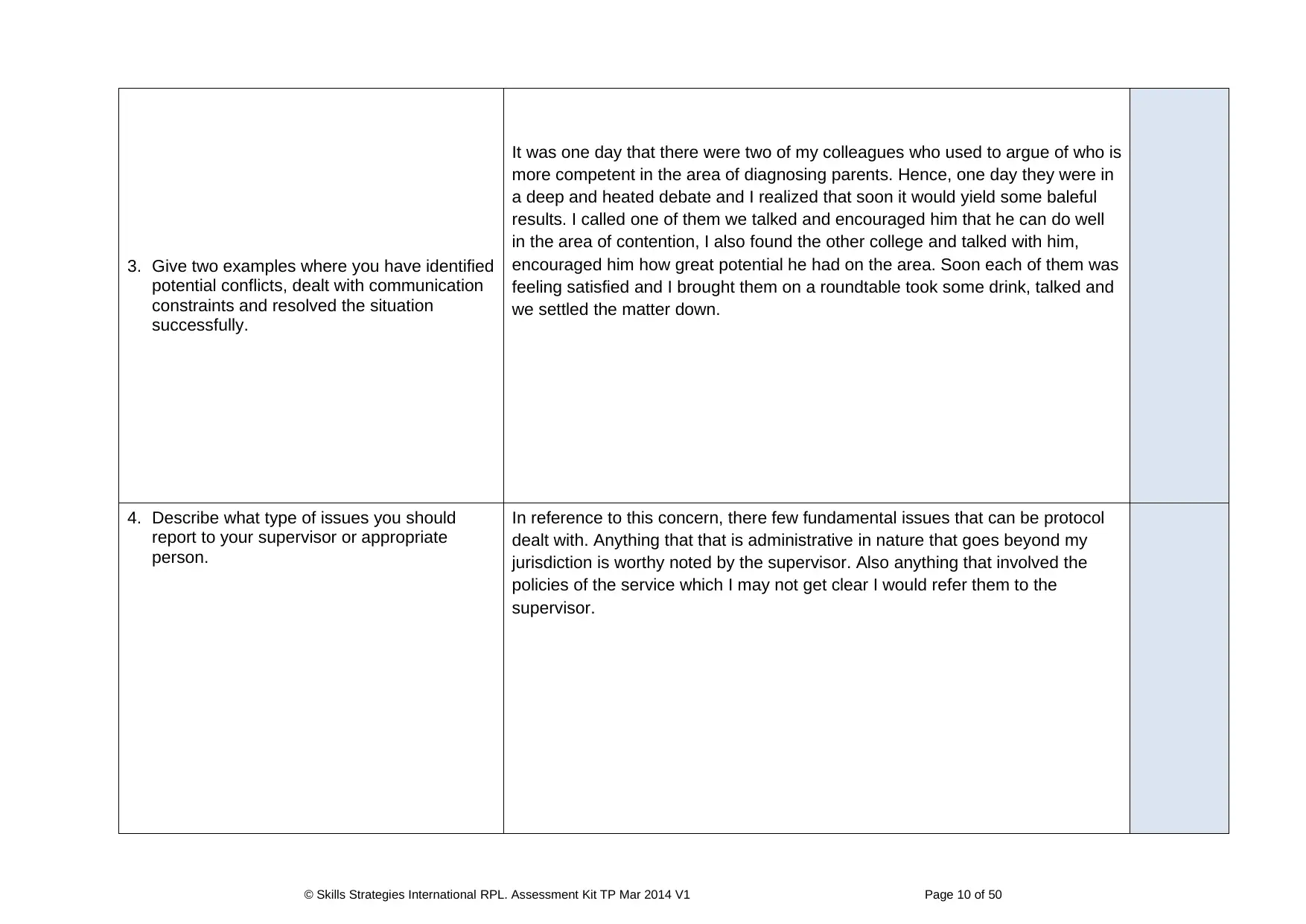
3. Give two examples where you have identified
potential conflicts, dealt with communication
constraints and resolved the situation
successfully.
It was one day that there were two of my colleagues who used to argue of who is
more competent in the area of diagnosing parents. Hence, one day they were in
a deep and heated debate and I realized that soon it would yield some baleful
results. I called one of them we talked and encouraged him that he can do well
in the area of contention, I also found the other college and talked with him,
encouraged him how great potential he had on the area. Soon each of them was
feeling satisfied and I brought them on a roundtable took some drink, talked and
we settled the matter down.
4. Describe what type of issues you should
report to your supervisor or appropriate
person.
In reference to this concern, there few fundamental issues that can be protocol
dealt with. Anything that that is administrative in nature that goes beyond my
jurisdiction is worthy noted by the supervisor. Also anything that involved the
policies of the service which I may not get clear I would refer them to the
supervisor.
© Skills Strategies International RPL. Assessment Kit TP Mar 2014 V1 Page 10 of 50
potential conflicts, dealt with communication
constraints and resolved the situation
successfully.
It was one day that there were two of my colleagues who used to argue of who is
more competent in the area of diagnosing parents. Hence, one day they were in
a deep and heated debate and I realized that soon it would yield some baleful
results. I called one of them we talked and encouraged him that he can do well
in the area of contention, I also found the other college and talked with him,
encouraged him how great potential he had on the area. Soon each of them was
feeling satisfied and I brought them on a roundtable took some drink, talked and
we settled the matter down.
4. Describe what type of issues you should
report to your supervisor or appropriate
person.
In reference to this concern, there few fundamental issues that can be protocol
dealt with. Anything that that is administrative in nature that goes beyond my
jurisdiction is worthy noted by the supervisor. Also anything that involved the
policies of the service which I may not get clear I would refer them to the
supervisor.
© Skills Strategies International RPL. Assessment Kit TP Mar 2014 V1 Page 10 of 50
Paraphrase This Document
Need a fresh take? Get an instant paraphrase of this document with our AI Paraphraser
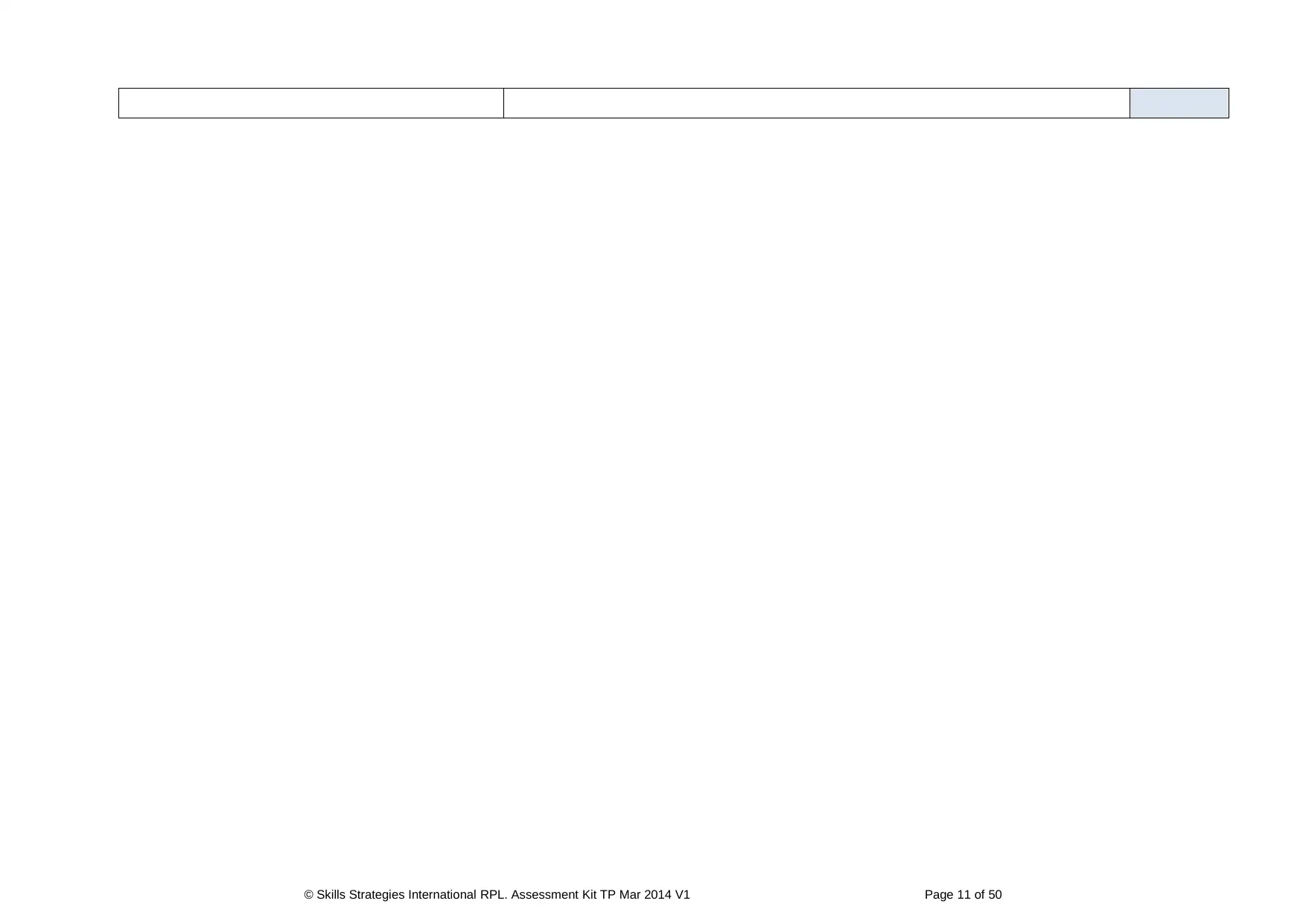
© Skills Strategies International RPL. Assessment Kit TP Mar 2014 V1 Page 11 of 50
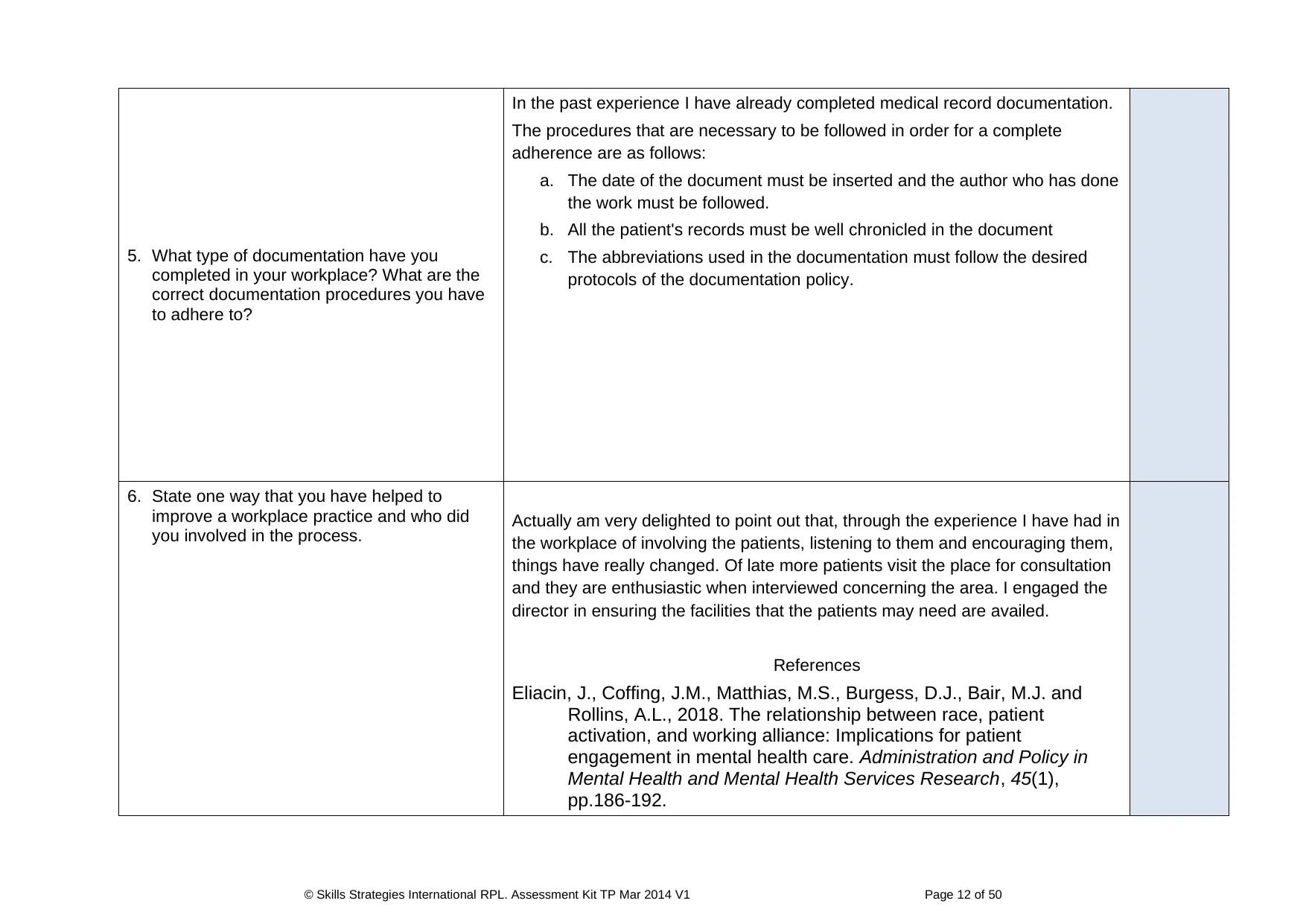
5. What type of documentation have you
completed in your workplace? What are the
correct documentation procedures you have
to adhere to?
In the past experience I have already completed medical record documentation.
The procedures that are necessary to be followed in order for a complete
adherence are as follows:
a. The date of the document must be inserted and the author who has done
the work must be followed.
b. All the patient's records must be well chronicled in the document
c. The abbreviations used in the documentation must follow the desired
protocols of the documentation policy.
6. State one way that you have helped to
improve a workplace practice and who did
you involved in the process. Actually am very delighted to point out that, through the experience I have had in
the workplace of involving the patients, listening to them and encouraging them,
things have really changed. Of late more patients visit the place for consultation
and they are enthusiastic when interviewed concerning the area. I engaged the
director in ensuring the facilities that the patients may need are availed.
References
Eliacin, J., Coffing, J.M., Matthias, M.S., Burgess, D.J., Bair, M.J. and
Rollins, A.L., 2018. The relationship between race, patient
activation, and working alliance: Implications for patient
engagement in mental health care. Administration and Policy in
Mental Health and Mental Health Services Research, 45(1),
pp.186-192.
© Skills Strategies International RPL. Assessment Kit TP Mar 2014 V1 Page 12 of 50
completed in your workplace? What are the
correct documentation procedures you have
to adhere to?
In the past experience I have already completed medical record documentation.
The procedures that are necessary to be followed in order for a complete
adherence are as follows:
a. The date of the document must be inserted and the author who has done
the work must be followed.
b. All the patient's records must be well chronicled in the document
c. The abbreviations used in the documentation must follow the desired
protocols of the documentation policy.
6. State one way that you have helped to
improve a workplace practice and who did
you involved in the process. Actually am very delighted to point out that, through the experience I have had in
the workplace of involving the patients, listening to them and encouraging them,
things have really changed. Of late more patients visit the place for consultation
and they are enthusiastic when interviewed concerning the area. I engaged the
director in ensuring the facilities that the patients may need are availed.
References
Eliacin, J., Coffing, J.M., Matthias, M.S., Burgess, D.J., Bair, M.J. and
Rollins, A.L., 2018. The relationship between race, patient
activation, and working alliance: Implications for patient
engagement in mental health care. Administration and Policy in
Mental Health and Mental Health Services Research, 45(1),
pp.186-192.
© Skills Strategies International RPL. Assessment Kit TP Mar 2014 V1 Page 12 of 50
⊘ This is a preview!⊘
Do you want full access?
Subscribe today to unlock all pages.

Trusted by 1+ million students worldwide
1 out of 50
Your All-in-One AI-Powered Toolkit for Academic Success.
+13062052269
info@desklib.com
Available 24*7 on WhatsApp / Email
![[object Object]](/_next/static/media/star-bottom.7253800d.svg)
Unlock your academic potential
Copyright © 2020–2026 A2Z Services. All Rights Reserved. Developed and managed by ZUCOL.